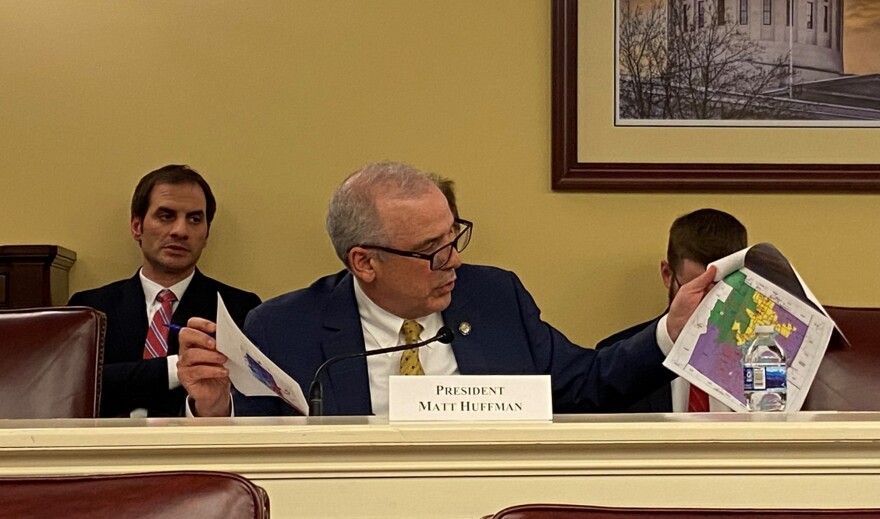The panel that was ordered to redraw the maps for state lawmakers that the Ohio Supreme Court ruled were unconstitutionally gerrymandered met for a second time on Thursday. But the Ohio Redistricting Commission failed to come up with an agreement.
There’s another meeting Friday morning, and the deadline to produce those maps is Saturday.
Republicans and Democrats on the commission presented breakdowns of their plans for House and Senate districts in Franklin and Union counties, and in Hamilton and Warren Counties.
Here are the proposed maps for Franklin and Union, and Hamilton and Warren (House districts first, then Senate districts) pic.twitter.com/H4obPYow8k
— Karen Kasler (@karenkasler) January 20, 2022
Co-chair Sen. Vernon Sykes (D-Akron) said he suggested looking at the overall map in sections.
"I made the suggestion that we do it that way because it was difficult, just starting out. If we start out with the plan, which plan do we start from?" Sykes said. "It was better for us to from the original conception, to look at building the building blocks of a map statewide, easier for us to focus on communities, as opposed to look into whole matter one time."
Co-chair House Speaker Bob Cupp (R-Lima) said more of the map will come out soon, but it's unclear what sections will be presented next.
The unconstitutional maps passed in September gave Republicans a 64% supermajority in the legislature.
Democrats said their proposed maps reach the 54% Republican, 46% Democratic split mentioned in the court’s ruling. Republicans said their plan for these two regions offers two more House and one more Senate seats favoring Democrats, but they haven’t released their statewide breakdown.
Though there were some specifics laid out in the commission's first meeting, there were some questions about the goals of the process.
Chris Glassburn, the map drawer for the Commission's two Democrats, said in his presentation that it's unclear about what the Republicans' end goal is in terms of the percentage split and other criteria.
"Not having certainly about that goal, whether we are going to achieve that proportionality or not, causes a lot of consternation and unnecessary levels of back and forth that preclude us from talking to the next region because we're still arguing about the current region as if it's a life and death manner," Glassburn said.
But Cupp told reporters afterward, "I think there must be some miscommunication somewhere, because the directions to our staff have been to draw district maps that fully comply with the constitutional requirements."
Cupp said they’re still trying to work out how to bring in public input besides the redistricting.ohio.gov website.
“The question is, if you if you don't already have a map, a new map, and you ask for public comment, you're going to get comment that we spent three weeks gathering," Cupp said. "If we run out of time, how are you going to get public input and meet the deadline?"
A handful of advocates who’d worked for changes to the redistricting process were at the meeting and have been pushing for public hearings.
Catherine Turcer from Common Cause Ohio, who was a key player in creating the 2015 amendment that changed the process, said after the meeting she's frustrated with this second round of the process, which may be confusing to some people trying to follow it.
"I can understand that having public testimony could get in the way of quickly getting these maps together," Turcer said "But they really need to do as much as possible in public so that we can watch and understand what's happening and live up to the obligations that are part of our Sunshine Law."
Copyright 2022 The Statehouse News Bureau. To see more, visit The Statehouse News Bureau.



